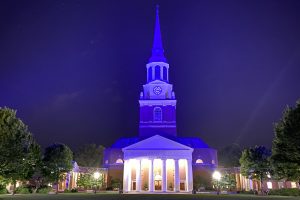By David Gushee
Last Monday (Sept. 15), I published an article in USA Today that has bounced around the blogosphere evoking intense reaction ever since. The argument of the article was that Sarah Palin’s nomination for vice president, and the warm conservative evangelical response to that nomination, raised uncomfortable but opportune questions to her core constituency. These questions related to their long-articulated theological vision of male leadership as well as of women’s primary vocation as homemakers and mothers. I ended with a series of questions for “complementarian” Christians related to the issues raised in the article.
I rarely respond to blog posts or to angry (or happy) letters about my articles, and I cannot say that I have read every word tossed my way this week, but I see an opportunity here to muse about some of the broader questions raised by my article and its respondents.
One correspondent suggested that I was airing dirty laundry in the evangelical world and should not have addressed such issues in a public forum. My response is that for the better part of two decades I worked for women’s full equality in various venues of Christian service and that private approaches yielded little fruit. Meanwhile many of the church’s most committed women suffered, their gifts blocked from full expression. If the laundry is dirty, perhaps it’s time for a wash.
The complementarian view of women’s proper roles in church and family is deeply entrenched and taken as an obvious truth by millions. Evoking its public defense before a broad audience seemed to me an appropriate goal, partly because I believe in the value of transparency and open public debate. I never intended to say that the world should set the tone for the church, or that because something is permitted in the world it should be permitted in the church. I did intend to stimulate a public defense (and a private rethinking) of the complementarian view of authority in the church, partly because that view has public consequences. That defense has in fact occurred over these recent days in a variety of venues.
Essentially, most complementarians have articulated what has become the standard view: the Bible teaches that women can exercise authoritative leadership in the secular sphere but not in the spiritual realm—or at home. This view is then buttressed by citing I Timothy 2:11-15, I Corinthians 11:3-10, Ephesians 5:22-33, and I Peter 3:1-7.
To be more precise, what today’s mainstream complementarians do with these passages is to construct a modified home-and-church patriarchalism in which a composite rendering of these passages is offered — without also offering the theological rationales that appear in the biblical texts themselves.
The composite rendering is the view that these texts prohibit women (only) from being pastors or leaders of their families. Even though I Timothy 2:12 says women should be silent in church, and I Corinthians 11:5-10 says women should not publicly pray or prophesy with uncovered heads, today’s complementarians don’t require women to be silent in church or to cover their heads when they pray and prophesy. They do synthesize these and other passages to argue that women must not be pastors.
Or is it that women must not be deacons? Or Sunday School teachers? Or youth ministers? In my original article I listed a wide range of ever-tightening prohibitions on the role of women as these are found in various churches. It has long been my view that the Achilles heel of the modern complementarians is the fact that all they can really agree on is that there’s something women must not be permitted to do, but not on what exactly that something is. Even during my days in the middle of this controversy at Southern Baptist Theological Seminary in the 1990s, the position shifted in just a few years from “women can’t be senior pastors” to “women can’t be pastors.” Before that, especially in the mainline denominations, the issue was ordination. For a time among Baptists the issue was the deacon role.
As for theological rationale, as Rebecca Merrill Groothuis points out in a devastating post dated September 20, the biblical texts cited by complementarians do sometimes offer deeper theological rationales for women’s subordination. But these rationales are no longer cited by mainstream complementarians, and in some cases they are explicitly rejected.
One could make an argument from creation, as Paul does in I Corinthians 11:7-10 and I Timothy 2:13a. In I Corinthians, Paul argues that man “is the image and glory of God, but the woman is the glory of man. For man did not come from woman, but woman from man; neither was man created for woman, but woman for man.” In I Timothy, the argument is that “Adam was formed first, and then Eve.” These are creation-based arguments, suggesting that Adam has priority in the order of creation, that his status as image of God is somehow different from the woman’s, that woman was made for man and not man for woman, and that woman was made from man and not man from woman. Paul seems to modify what is perhaps an inherited position on this issue in the next few verses (I Cor. 11:11-12), but the words are there earlier in the text and ready to be cited if one might want to use them.
Likewise, an argument from the fall of humanity is also available, because it says in I Timothy 2:14, “And Adam was not the one deceived; it was the woman who was deceived and became a sinner.” This at least seems to suggest that women carry either a moral responsibility for the fall or an intrinsic moral inferiority that disqualifies them from speaking in church or exercising spiritual authority. But the idea that women should be barred from spiritual leadership because of either of these reasons has been absent in recent mainstream complementarian argument.
If complementarians are unwilling to make an argument from creation, or from the fall, or (for that matter) from redemption, all that is left are fragments of a couple of passages read apart from cultural context that hang in mid-air without any particular grounding. Unwilling to adopt the thoroughgoing patriarchalism of the flat-out traditionalists, which at least had the virtue of being consistent, they cite this handful of passages and end with the historically contingent composite view that what the Bible teaches is that women can be anything they want to be in the secular arena but not at home or in church. They really cannot say why God would decree that a woman can be president but not pastor, but they are convinced that God has indeed decreed it.
I call this a historically contingent view because it clearly represents an evolution of earlier, much more subordinationist perspectives that can easily be cited from the long history of Christian thought. It marks a kind of compromise of religious patriarchalism with the realities that exist in a society committed since the 1960s to gender egalitarianism, as well as an economy that has become dependent on women’s labor. It is a fallback position that has changed subtly even since I first encountered it in the mid-1980s. Undoubtedly it will change again. This, at least, is my interpretation of their current interpretation of the Bible.
The Scriptures are authoritative and do not change. Any individual or group interpretation of the Scriptures is not authoritative and (it is a fact) can change. Sometimes it must change, as in the struggle over the interpretation of the many Scripture passages related to slavery. Let no one doubt my 30-year-long Baptist and evangelical identity because I point out the historical contingency and possible error of someone’s interpretation of the Scriptures — including my own, for which I claim no infallibility. It is the theological vision of this vestigial patriarchalism that in my article I called “archaic,” not the Bible itself.
In Kingdom Ethics (Intervarsity Press, 2003), Glen Stassen and I suggested a model for how moral norms work, in which specific rules are grounded in broader principles, and principles are themselves grounded in broader theological or worldview convictions. We argued that at times in Christian and other communities we encounter rules that no longer seem to be grounded in any deeper principle or core theological conviction. Usually, this means it is time to rethink the rule.
I would argue that “women can’t be pastors” is exactly such a rule. I grant that it is a plausible composite or synthesis of specific biblical phrases and sentences, and I respect those who hold this view out of a desire to be faithful to Scripture. But no mainstream conservative theological voice today seems willing or able to offer a broader principle or understanding of God’s character and action that can ground this rule. It’s not because women are spiritually inferior, or less intelligent, or morally weaker, or lack leadership skills, or aren’t gifted by the Spirit with relevant spiritual gifts. It’s just because … well, because we say God says so, and here are a few verses we read as backing this up.
But when one thinks about the God who is busily involved in the mission of redeeming the world, one wonders why such a God would restrict the forces available to be deployed in this struggle. When one thinks about Jesus’ welcome of the marginalized, one wonders why this Jesus would create a church in which women are systematically marginalized. When one thinks about a God who hears the cries of the oppressed, one wonders about why God would order the oppression of more than half of those who come to be his people in the church. And when one thinks about a kingdom, the kingdom Jesus proclaimed, which is marked by such joyful realities as justice and the inclusion of the previously rejected, one wonders why such a God would command that women be treated with such injustice and excluded from the leadership that their gifts prepare them for.
Can I be a bit more personal? Can I say that one reason why I took on this issue last week is because I have watched women weep over their exclusion and the suppression of their gifts? Does this matter in theology? Or are we just deductive reasoning machines? Does God speak through the tears of the many women I taught who were told (often derisively) by their classmates and by some of their professors that God could not call them to be pastors and that they really didn’t need to be studying theology or ministry? Does God speak through the voices of gifted daughters of the church who were told so often that they must not pursue their sense of call that they experienced a crippling sense of inferiority, powerlessness, and confusion? Does it matter that three of the most effective and influential ministers who have blessed the life of my family have been women, and that I shudder when I think about the suppression of their gifts and what that would have meant in the life of our family and those churches? Would it be acceptable to mention that I know women who have left the Church (not just a church) because they could not believe in a God who would degrade women in this way?
I believe in a Savior who hears the cries of all who are oppressed, who welcomes marginal ones and outcasts into full community, who loves and demands justice, and who wants every single spiritual gift he has given to every person in his church exercised in all of its fullness — until he comes again and brings history to its long-awaited culmination, when all tears are wiped away at last.
Ultimately, this debate is about who Jesus is and what he is about in the church and in the world.





































































